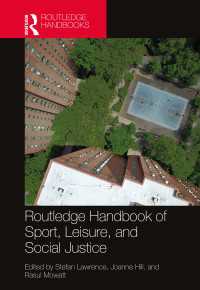Description
The Oxford Handbook of Philosophy of Political Science contains twenty-seven freshly written chapters to give the reader a panoramic introduction to philosophical issues in the practice of political science. Simultaneously, it advances the field of Philosophy of Political Science by creating a fruitful meeting place where both philosophers and practicing political scientists contribute and discuss. These philosophical discussions are close to and informed by actual developments in political science, making philosophy of science continuous with the sciences, another aspiration that motivates this volume. The chapters fall under four headings: (1) evaluating theoretical frameworks in political science; (2) methodological challenges and reconciliations; (3) the purposes and uses of political science; and, (4) the interactions between political science and society. Specific topics discussed include the biology of political attitudes, intra-agent mechanisms, rational choice explanations, theories of collective action, explaining institutional change, conceptualizing and measuring democracy, process tracing, qualitative comparative analysis, interpretivism and positivism, mixed methods, within-cause causal inference, evidential pluralism, lab and field experiments, external validity, contextualization, prediction, expertise, clientelism, feminism, values, and progress in political science.
Table of Contents
AcknowledgmentsList of ContributorsChapter 1. Putting Philosophy of Political Science on the map - Harold Kincaid and Jeroen Van BouwelPart 1. Analyzing Basic Frameworks in Political ScienceChapter 2. The Biology of Politics: Some Limitations and Reasons for Caution - Jonathan KaplanChapter 3. The Biological Aspects of Political Attitudes - David Henderson and Stephen SchneiderChapter 4. Rational Choice Explanations in Political Science - Catherine Herfeld and Johannes MarxChapter 5. Strategic Theory of Norms for Empirical Applications in Political Science and Political Economy - Don Ross, Wynn C. Stirling and Luca TummoliniChapter 6. Explaining Institutional Change - Emrah Aydinonat and Petri YlikoskiChapter 7. Public Choice vs Social Choice as Theories of Collective Action - Jesús Zamora-BonillaChapter 8. Nineteen Kinds of Theories about Mechanisms that Every Social Science Graduate Student Should Know - Andrew Bennett and Benjamin MishkinPart 2. Methods in Political Science, Debates and ReconciliationsChapter 9. Conceptualizing and Measuring Democracy - Sharon CrasnowChapter 10. Qualitative Research in Political Science - Julie ZahleChapter 11. Interpretivism versus Positivism in an Age of Causal Inference - Janet Lawler and David WaldnerChapter 12. Qualitative Comparative Analysis (QCA): A pluralistic approach to causal inference - Federica Russo and Benoît RihouxChapter 13. Mixed methods research and the variety of evidence in political science - Jaakko Kuorikoski and Caterina MarchionniChapter 14. Generalization, case studies, and within-case causal inference: Large-N Qualitative Analysis - Gary Goertz and Stephan HaggardChapter 15. Process Tracing: Defining the Undefinable - Christopher ClarkeChapter 16. Process Tracing: Process Tracing: Causation and Levels of Analysis - Keith DowdingChapter 17. Interventions in Political Science - Peter JohnChapter 18. Lab Experiments in Political Science through the Lens of Experimental Economics - Andre Hofmeyr and Harold KincaidPart 3. Purposes and Uses of Political ScienceChapter 19. Philosophy of Science Issues in Clientelism Research - Harold Kincaid, Miquel Pellicer and Eva WegnerChapter 20. External Validity in Philosophy and Political Science: Three Paradoxes - Maria Jiménez-BuedoChapter 21. Context, Contextualization and Case-Study Research - Attilia RuzzeneChapter 22. Prediction, history and political science - Robert NorthcottPart 4. Political Science in Society: Values, Expertise and ProgressChapter 23. Taking Feminism Seriously in Political Science: A Cross-Disciplinary Dialog - Season Hoard, Laci Hubbard-Mattix, Amy G. Mazur and Samantha NollChapter 24. Dealing with Values in Political Science - Jeroen Van BouwelChapter 25. Positivism and Value Free Ideals in Political Science - Harold KincaidChapter 26. Political Experts, Expertise, and Expert Judgment - Julian ReissChapter 27. Progress in International Politics: The Democratic Peace Debate - Fred Chernoff








